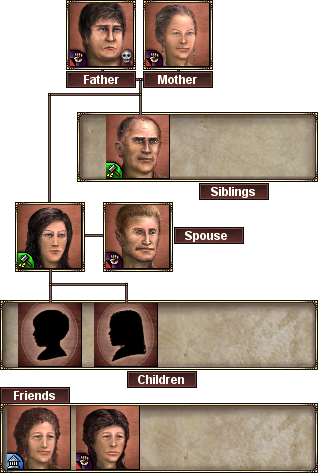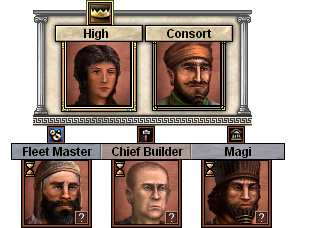Paradox Interactive, 2008
I liked Europa Universalis II, but gave Europa Universalis III a lukewarm review for just being more of the same. "I am still totally going to get the Roman one due out this year, though," I wrote. And I did! Admittedly, "that year" was 2008, and now we're drawing close to the end of 2014, and I bought the game mainly because I needed to add five dollars to my Amazon purchase to qualify for free shipping… but I did follow through on my vow!
Like the previous Europa Universalis games, EU: Rome is built around siege warfare. When you enter an enemy territory and defeat any armies that might be holding it, you don't automatically take possession of it: you have to sit there for months on end starving out the citizenry before storming the city walls. Even then, you merely occupy the territory rather than own it; to add it to your empire, you actually have to get your adversary to sign it over to you at the treaty table. And you're still not completely in the clear, because the people who actually live there are likely to revolt on a regular basis, especially if their culture or religion differs from yours.
What keeps this from being the exact same game in classical garb is that, in addition to hundreds of provinces, EU: Rome also tracks hundreds of people. In the earlier EU games, yes, you'd have one king die and be replaced by a king with different stats, and royal marriages were a key element of diplomacy, but that was about the extent of it. In EU: Rome, you have to select each governor, each minister, each general from a group of candidates, each of whom has not just a set of stats but a set of qualities as well. For instance, take Gaius Sempronius Blaesus, who is "Just", "Generous", and "Energetic", but also "Proud", "Stressed", and "Sarcastic". Appius Claudius Russus is "Good Natured", but "Lustful" and "Weakwilled". Some characters are epileptic. Some speak with a lisp. All are part of a network of relationships; here are the friends and family of one Cornelia Merenda, who was born in the province of Bononia on December 3 in the year 230 BCE:

These people are computer-generated, their portraits built Mr. Potato Head-style from a stock of eyes, noses, mouths, chins, cheeks, necks, ears, and haircuts. And managing them is actually a bigger part of the game than the international diplomacy and warfare. Windows are constantly popping up to say that the praetor has bribed you fifteen gold to appoint his buddy as dux of Cyrenaica, or that the schizophrenic brother of the pontifex maximus just murdered his own 10-year-old daughter for "dishonoring the family", or that the legate of the 3rd Legion refuses to transfer any of his troops to another commander unless you hold a triumph in his honor first. (Any given legion that you see on the map might consist of dozens of different units, and each unit has its own individual loyalties, which determines which side it will take should a would-be usurper take arms against the state.) Note the hammer in the corner of Cornelia's portrait: Rome is a republic, so each character bears an allegiance to one of five political parties, and the green badge indicates that Cornelia is part of the Civic Faction. This is important because a Military consul who wants to conquer a neighbor might find that the Senate is controlled by the Mercantile Faction, which wants him to build harbors instead. The game tracks so much data that by the end of a campaign, each save file cracks the 80 MB mark.
I just mentioned that Rome is a republic, but despite the name of the game, you don't have to play Rome. You can play anyone. Want to head up to what would become Scotland and play the Picts? Meet your clan chiefs:

(I think I saw that fourth guy posting libertarian screeds in the comments on a former co-worker's Facebook post.)
Alternatively, I have here a saved game from the year 54 BCE, and it only takes one click to switch from playing Rome to, say, Armenia. As a Near Eastern theocracy, Armenia lacks a senate, but High Priestess Parmys Alcetid does have ministers; here's a small portion of what the government window looks like:

Note that the Chief Builder there, Sthenelaus Philonid, looks rather different from the rest; that is because he is an ethnic Greek, whose family migrated to Assyria when it was part of the Hellenistic Seleucid Empire, but who has chosen to serve the Armenian court because he is a Zoroastrian. (Sthenelaus is pious and loving, but stubborn, and dies of leprosy at the age of 43.) It is interesting to watch nations expand from monolithic tribes to multicultural empires — to be fighting to wipe Carthage from the map, and then a few decades later to have someone named Bomilcar Adonibaalid in charge of the Roman army. It is equally interesting, especially in light of the debate over whether video games are artworks that can convey themes, to find yourself with a bunch of incompetent generals, only to discover that there's a character whose natural Martial ability is 10 out of 10, and who has the Tactician and Conquerer attributes — but whom you can't appoint, because she's female. Might as well call her Judith Caesar.
I wish I could say that all of the above added up to a great game, but I can't. EU: Rome is actually not all that fun; it's sort of the hop-clap-kweepa maze of strategy games. You direct an army into a neighboring territory, and before it's even a third of the way there, you have to hit pause and fill a ministry from a list of candidates, bribe a disloyal commander, replace a corrupt governor, decide whether Gaius should choose Lucius as a friend and Marcus as a rival or the other way around, decide whether to encourage or discourage your child's domineering behavior on the playground… and then when you start the clock moving again, literally one second will tick by, and your army will barely have moved, and you have to do it all over again. Some automation would have been greatly appreciated. What makes this worse is that all of these decisions have little obvious effect. For instance, one of the things you're supposed to do every couple of minutes is invoke an omen — i.e., go to the religion window, where you will see a menu of gods (a different menu for each religion, naturally!), and pick one to seek a boon from. Seems like a momentous choice… but all that really happens is that if you select Ares your army's morale might go up a few percentage points whereas if you select Aphrodite your population growth rate might tick up a tiny amount. Or you might have to choose whether you'd prefer a 5% bump in loyalty points or popularity points. Unlike the Civilization games, in which your tech tree and Wonder decisions dramatically change the fundamentals of how your society functions, very little that you do in EU: Rome makes any visible difference.
One knock against the Europa Universalis series is that the titles are not so much games as history sims, without any clear goals. EU: Rome gives the player particular missions to accomplish, such as "Conquer Magna Graecia" or "Get Access to Horses", but the rewards can be dubious. You might be told that if you accomplish your goal, the Populist Faction will gain five senators — well, what if the Populists have been getting in the way of your plans, and you'd like to have fewer? If you play as Rome, completing your first mission wins you one stability point (that's good) and five prominence points for your consul — which also seems good, up to the point that another consul is voted in, and the previous one uses those extra prominence points to attract rebels to his uprising. It just seems weird for a game to ask you to make decisions on behalf of a character whose agenda differs from yours. Or, no, that's not it exactly — what's weird is that the game asks you to make decisions on behalf of a bunch of different characters whose agenda differs from yours and from each other's. People who play Varicella may not have any inherent desire to see the Palace Minister triumph over the War Minister and the Interior Minister and the rest, but they will generally go along in helping him achieve his ends, because it's the stated and consistent goal of the piece. Now imagine a version in which every fifteen minutes you're playing a different minister. Confusing!
Oh, and the game crashes a lot. In my first campaign it crashed every half hour or so. When I attempted a second one, it could rarely go more than about thirty seconds without freezing up. I also wasn't a big fan of the many, many language errors in the game; yes, Paradox is a Swedish outfit and so English isn't the creators' first language, but still, hire a dang copyeditor. All in all, though, I reckon that EU: Rome afforded me more enjoyment than the loaf of bread I would otherwise have spent my five bucks on would have, so I can't complain too much.


